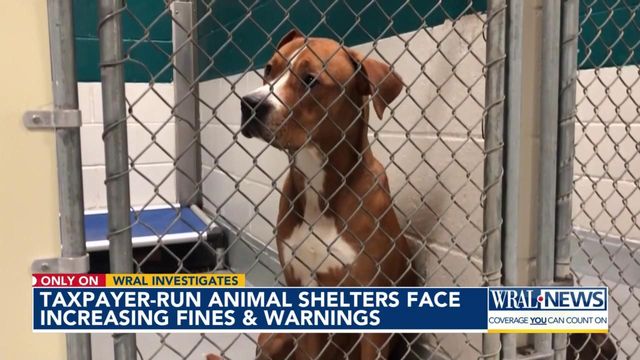Dead animals, broken legs and lack of vet care: WRAL Investigates taxpayer-run animal shelters
More than 6.5 million animals entered shelters or rescues in 2023, according to Shelter Animals Count. That was a slight increase compared to 2022.
The surge in abandoned and surrendered animals has created a rough couple of years for shelters.
Wake County was forced to stop pet surrenders for several weeks. Other shelters, like Cumberland County, waived adoption fees to make room for new animals.
"They’re being overwhelmed," said Doctor Patricia Norris, the state Animal Welfare Director. She describes the current shelter situation as a powder keg, "They can’t afford the care, provide the vet care because veterinary care has gotten so expensive. Dog food has gotten really expensive."
WRAL Investigates found more shelters are struggling to provide proper care and they’re getting called out for it.
"If you can’t provide the veterinary care for an animal you either have to euthanize it or get it veterinary care, that’s it. You can’t allow an animal to suffer in a shelter," Norris said.
Since the start of 2023, 13 taxpayer-run shelters or their employees in North Carolina have been fined or warned. That’s more than total fines and warnings issued the previous four years, when counties were punished 10 times.
The State Department of Agriculture provided photos of several recent inspections that led to fines. They showed animals in filthy living conditions, injured dogs and cats and shelters in disrepair.
Robeson County, south of Fayetteville, incurred the biggest fine at nearly $14,000. Inspector notes say two employees, including the director himself, euthanized more than 1,000 animals even though their euthanization certificates were expired.
The report also notes each man euthanized six animals prior to the 72-hour holding period with no supporting documents as to why the animal needed to be put down, like an injury or illness.
Robeson County reached a settlement agreement which lowered its fine. The employees each paid their fines, according to the department officials.
Just to the west, Montgomery County’s shelter was fined more than $4,000 for failing to get timely medical care for three dogs; one with a broken leg, one with a fractured or dislocated hip and a third known to have a long-standing injury.
Montgomery County is appealing the fine. In a statement, County Manager Frankie Maness said, "We have presented evidence that was not considered when the fine was administered and are in conversation with the Department about the next steps. There are items in that letter that are simply not true …"
Out west, in Lincoln County, a $1,400 fine because a dog was euthanized in June after her temperature hit 108 degrees while being transported back to the shelter from a spay and neuter clinic. The inspector noted a lack of air flow in the rear of the transport vehicle.
Finally, Rutherford County was hit with a $6,100 fine after multiple inspections over a two-week period which included a dead dog and dead cat found in kennels. Inspectors also found dogs left without water.
"Water is critical for the animals. They’re required to have water 24/7," Norris said of the rules.
Norris emphasized her office only issues fines as a last resort, either after repeated violations or something so bad it can’t go unpunished. For the most part, they try to work with shelters to improve conditions, rather than fining them and impacting already tight budgets.
"We understand the struggles, but we also understand that we cannot allow animals to be suffering in shelters. Period," Norris said emphatically.
There is good news for county shelters with money troubles. The General Assembly created the Animal Shelter Support Fund this year. There’s a $250,000 pot of money to fund grant requests from county-run shelters to help pay for improvements.










